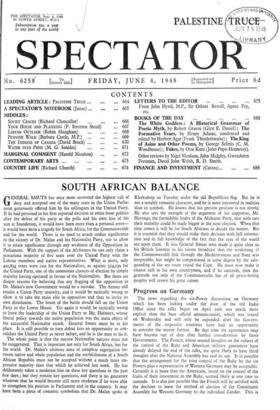SOUTH AFRICAN BALANCE
GENERAL SMUTS has once more answered the highest call of duty and accepted one of the many seats in the Union Parlia- ment generously offered him by his colleagues in the United Party. If he had persisted in his first reported decision to retire from politics after the defeat of his party at the polls and his own loss of his seat at Standerton, it would have been more than a personal error— it would have been a tragedy for South Africa, for the Commonwealth and for the world. There is no need to attach undue significance to the victory of Dr. Malan and his Nationalist Party, nor to allow it to attain significance through any weakness of the Opposition in Parliament. With the support of the Afrikaners he can only claim a precarious majority of five seats over the United Party with the Labour members and native representatives. What is more, only 401,834 votes were cast for the Nationalists, as against 524,230 for the United Party, one of the commoner chances of election by simple majority having operated in favour of the Nationalists. But there are deeper reasons for believing that any flagging of the opposition to Dr. Malan's new Government would be a mistake. The Senate still retains a Union Party majority, and it would be tactically wrong to allow it to take the main role in opposition and thus to invite its own dissolution. The brunt of the battle should fall on the Union Party in the Lower House. Yet again it would be tactically wrong to leave the leadership of the Union Party to Mr. Hofmeyr, whose liberal policy towards the native population was the main object of the successful Nationalist attack. General Smuts must be in his place. It is still possible to turn defeat into an opportunity to con- solidate the United Party as never before, and he is the man to do it.
The whole point is that the narrow Nationalist success must not be exaggerated. That is important not only for South Africa, but for the world. Dr. Malan's ultimate aims of complete segregation be- tween native and white population and the establishment of a South African Republic must not be accepted without a much more im- pressive majority than that which he achieved last week. He has deliberately taken a moderate line on these key questions in the past few days ; but they remain key questions, and there is no guarantee whatever that he would become still more moderate if he were able to strengthen his position in Parliament and in the country. It may have been a piece of romantic symbolism that Dr. Malan spoke at
Klerksdorp on Tuesday under the old Republican flag. But he is not a notably romantic character, and he is more interested in realities than in symbols. He knows that his present position is not strong. He also sees the strength of the argument of his supporter, Mr. Havenga, the formidable leader of the Afrikaner Party, that with care their majority could be made bigger at the next election. When that time comes it will be for South Africans to decide the matter. But it is essential that they should make their decision with full informa- tion and in full knowledge of the fact that the eyes of the world are upon them. It was General Smuts who made it quite clear to his British listeners to his recent broadcast that the weakening of the Commonwealth link through the Mediterranean and Suez was irreparable, but might be compensated in some degree by the safe- guarding of the sea route round the Cape. He must now make it clearer still to his own countrymen, and if he succeeds, then the gratitude not only of the Commonwealth but of all peace-loving peoples will crown his great career.


































